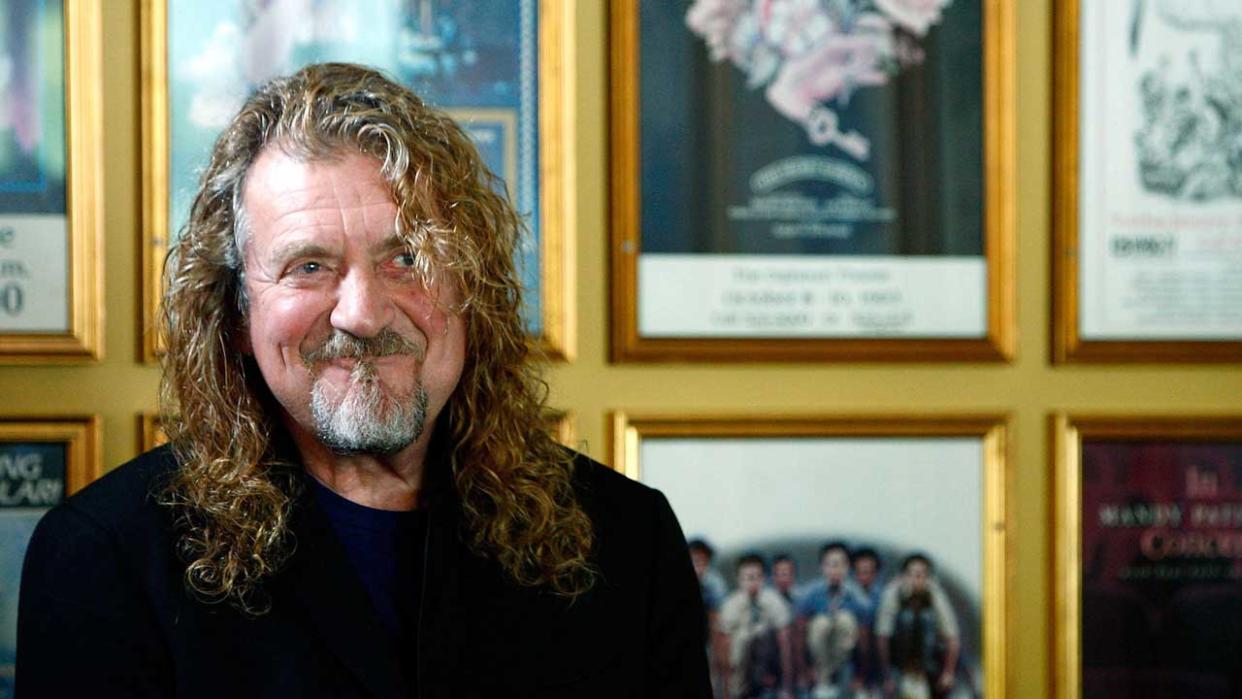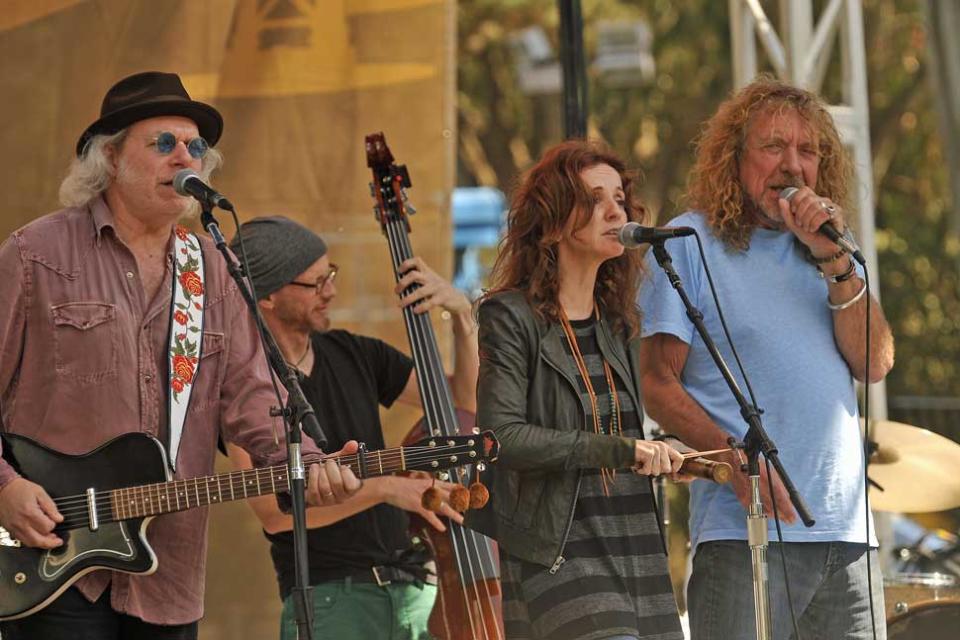"I did all that Hammer Of The Gods stuff – I lived Hammer Of The Gods!": Robert Plant looks back

In 2010, Robert Plant released Band Of Joy, his first solo album since Raising Sand, his multiple award-winning collaboration with bluegrass star Allison Kraus. The album was recorded in Nashville with legendary musician Buddy Miller. "Buddy's zone is beautiful," said Plant, "with a lot of reflections going back into mid-fifties rockabilly, the singing fishermen and all the great country stuff, along with the soul and R&B from Memphis." In this 2010 interview with Classic Rock, Plant takes stock, talking past, present and future.

A car screeches to a stop on the corner of Fitzroy Road in North London. From the driver’s side, a hand reaches over and opens the passenger door. “Stand on that corner and wait,” orders the car’s sole occupant.
I take in my surroundings: posh ladies walking their dogs, a couple of boulangeries, the odd bistro… All very ordinary, all very normal.
After a few minutes, seemingly from out of nowhere, a whisper in my ear makes me jump: “Fancy coming for a walk in the park with an old man?”. It’s the best offer I’ve had all year. Especially considering the proposition has come from Robert Plant.
In the time it takes the pair of us to walk across the road and into Primrose Hill Park, the singer with the back-story you could write not just a book but a whole library about has already squeezed in stories about Noddy Holder’s father, legendary publicist BP Fallon and pioneering 60s British bluesman Alexis Korner. Although now in his 60s, Plant is dressed like a teenaged backpacker, and still has an impressive mane of blond-grey ringlets spilling down his back. “When I go to North Africa they think I’m a chick!” he says.
Once inside the park, he spots an empty bench and breaks into a gentle jog: “Quick,” he says, grinning, “before anyone else gets it.”
An avuncular presence, Robert Plant wears his legacy very lightly, has a wicked and lively sense of humour and tells some truly jaw-dropping off-the-record stories. The latest addition to that legacy is his new album Band Of Joy, a perhaps unexpectedly eclectic collection recorded with a cast that includes American veteran Buddy Miller (guitar, bass, production) and Texan vocalist/ singer-songwriter Patty Griffin. Despite the fact Plant’s previous album, his and Alison Krauss’s Raising Sand, picked up a truckload of awards, he decided not to go down the same road again this time, and has instead travelled different musical routes.

Is your new album, Band Of Joy, in any way a follow-up to Raising Sand?
Not really. But, like Raising Sand, it’s not a rock’n’roll album. Rock’n’roll is all about the frontman, about the adrenalin, and I’ve been making music in that style for 44 years. But, encouraged by Alison Krauss on the last album, I’ve found this amazing alternative way of singing. My voice is navigating in a different direction now. It’s more singing around the hearth at night time with fiddles to this beautiful acoustic music. I think I’ve taken my vocal style and fitted very comfortably into that world. When you see us play this new album live you’ll hear the vocal harmonies – there’s six of us singing together sometimes.
You picked out Buddy Miller (Band Of Joy’s producer and guitarist, seen above with Patti Griffin and Plant) a number of years ago, didn’t you?
Yes. About ten or 12 years ago I was in this lovely old theatre in Dublin, The Olympia, to see Emmylou Harris. Playing with her that night was an amazing guy called Brian Blade, but what really caught my eye was the guitarist, Buddy Miller. He played with such finesse, but still with those jagged edges. You know, I think what Daniel Lanois brought to that album [Harris’s Wrecking Ball] was revelatory, and I sort of refocused after that. I wanted to turn the dial, to be shaken and stirred a bit. A singer should never be typecast. I did all that Hammer Of The Gods stuff – I lived Hammer Of The Gods! It was time for something different.
The name Band Of Joy has special relevance to you.
Band Of Joy was the name of the band myself and John Bonham were in before Led Zeppelin. Back then I was totally into soul music – the first album I ever got was an import copy of James Brown’s Live At The Apollo. I remember playing all the all-nighters – The Twisted Wheel, The Catacombs. I was playing support to Lee Dorsey and Buddy Guy.
We got Northern Soul, which was a bastardised version of black American soul. It was all amphetamine sulphate at the all-nighters in the days before we all got trippy. Back when I was 17 I recorded a Young Rascals [blue- eyed soul group best-known for their lazy 60s hit Groovin’] song, and here I am 44 years later, back with American music.
Is there still that staggering £200 million offer on the table for a re-formed Led Zeppelin?
Others may want it [a Zeppelin reunion], but I’m doing this now. I’m playing with a fantastic band, exploring all this magnificent music, both antique and modern, and we can play great little venues and really get a vibe going. Zep in their prime, I’m so proud of that, but let’s have a little decorum about it now.
How’s that famous falsetto of yours holding out?
I can still get up there, but I’d pass out if I had to do that falsetto all the time. I did this charity show for Wolverhampton Wanderers [the football team Plant has supported since his youth] a few weeks ago. I did Ramble On and Over The Hills And Far Away, and I did go right up there – you could see all these people who were eating their five-course dinners nudging themselves.
Did it really take just a week to record the new album?
We got it all down in ten days. I always find those first four hours in the studio with a bunch of new musicians are really crucial. You barely know their first names but you just dive in. That first session we got two songs finished. I felt like I was at the head of a Viking boat just discovering all these new territories.
We recorded it in Nashville, and just travelling about when I was there, to the places where some of these songs had originally come from, was a real education. I met all these guys up in the Tennessee mountains. I met Wanda Jackson out in the Mojave desert. She’s 78 and she has this beehive and is telling you all these Elvis stories. She’s working with Jack White now, which is an excellent idea.
Are you still a musical anthropologist?
Very much. On my many visits to North Africa, in the souk I would pick up all these cassette tapes of Berber music and work out the chords when I got home. It’s a music that runs parallel to ours. The links are all there, the links between Irish and English folk music and southern US country music being particularly strong. I love tinkering around with all this stuff. I think of it as an adventure.
Can you see yourself writing any original material any time soon?
The creative push we all got from this album means that Patti Griffin and I are talking about writing together, doing some original material. She’s got this place in Nashville which looks just ideal. For me it’s no longer to do with ego, or even having a visible success. My past was something fantastic – and I want it to remain that way. I’m fine where I am now, getting right down into the earth of music.
This interview was first published in Classic Rock issue 151, published in November 2010.
